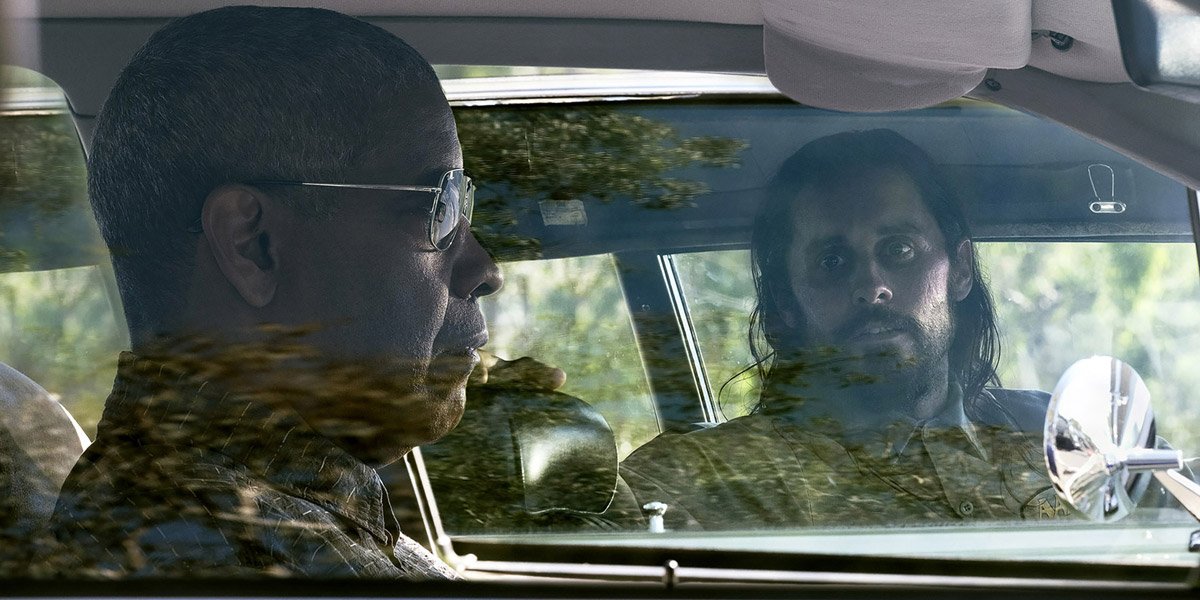A film’s capacity to surprise is always going to be one of its strongest weapons. As frequently as movies are made and released, one can never underappreciate the value in showing an audience something that they’ve never seen before. Clever plotting and smart twists can make or break an experience – otherwise viewers may find themselves questioning why they spent two hours watching something that they feel like they’ve watched 100 times before (possibly with better execution). If what’s delivered is only what’s expected, the result is going to be boredom.
This is the trap ensnared around the leg of John Lee Hancock’s The Little Things. Harkening back to the post-Silence of the Lambs era and gritty serial killer thrillers like Se7en, Summer Of Sam, and Kalifornia, the film has a firm foundation to build on in the genre, three above-the-title stars as leads, and it envelops the audience in the proper seedy aesthetic, but what it’s lacking is a screenplay with punch or originality. It winds up trapped in its own plotting, and though there are exciting sequences built in, it struggles to overcome its inherent issues.
The film stars Denzel Washington as Joe “Deke” Deacon, an aging patrol deputy in a small county two hours north of Los Angeles who is all but running out the clock on his career in law enforcement. With a dark history and a bad attitude, he’s not precisely loved by his colleagues, and partially by extension of this he finds himself at the start of the story being forced to travel down to the Southland so that he can pick up some evidence. It’s a job that he is reticent about at first, as that aforementioned dark history played out in L.A., but he begrudgingly takes the assignment.
He is quick to find frustration in the task, as he is told by the lab that he has to wait 24 hours before his evidence will be made available, but he is also quick to find a distraction: his old precinct is teeming with activity due to an on-going case involving a serial killer who specifically targets women. He doesn’t exactly make a prime first impression on the officer running the investigation, Sgt. Jim Baxter (Rami Malek), as Deke double parks and blocks him in during his initial visit, but the two men eventually get to talking, and Baxter makes the call to let Deke tag along to the murderer’s latest crime scene as a pair of fresh eyes.
Deke is not only helpful, as he is able to discover a hideaway from which the killer watched the victim, but he also becomes convinced that the criminal at work is the same one who he was hunting at the end of his time in Los Angeles – a.k.a. it’s the case that essentially broke him. Though he is warned against it, Baxter makes that call to have the patrol deputy work alongside him, and it takes no time at all for the new partner to become obsessive. Following leads, Deke becomes totally convinced that a creepy appliance deliveryman named Albert Sparma (Jared Leto) is responsible for the crimes, but the duo struggle to uncover hard evidence to prove their theory, and find themselves going to deeper and deeper depths to discover the truth.
The Little Things traps itself in a box story-wise, and can never find a way to escape.
The Little Things chugs along well enough in its first act, laying down all of the necessary exposition, providing a sense of the characters, and setting the general mood, but where it breaks down is when it pinholes its focus of Jared Leto’s Albert Sparma, sapping the movie of its compelling mystery. To use one of the examples given earlier, it’s like if Se7en kept Kevin Spacey floating around for the majority of the story. As soon as Sparma shows up, the whole plot narrows down to “is this oily creep the killer or not?” and that idea proves too basic to keep up any kind of momentum. Either he is the murderer in question, which is the automatic assumption given the stunt casting; or he’s not the murderer, which is the more inventive direction, but also totally hampered by the fact that the movie provides zero alternative avenues for a proper ending.
I won’t spoil here which way it goes, but I can tell you that it leads to a deeply unsatisfying conclusion.
It’s legitimately peculiar how generic and on-the-nose The Little Things can be.
There are some smart and well-crafted sequences that emerge, such as a bit of freeway cat-and-mouse played by Deke and Sparma that has you questioning who is following who, and an interesting corruption of witness testimony. Mostly, though, it’s odd how The Little Things seems to commit itself to cliché. Cinema would be better as an art form if we never hear a villain say, “You and I are a lot alike” to a protagonist ever again, but this is the exact kind of movie that just keeps on delivering it, and lo and behold Sparma makes that precise connection with Baxter while they ride together in a car.
From an illegal, clandestine search of Sparma’s apartment, to emotional eruptions in an interrogation room, recycled material plays throughout, and even the music choices are eye-roll inducing – with picks like “I Will Follow Him” by Little Peggy March, and Tommy Tutone’s “867-5309 (Jenny)” playing behind a scene with a discussion of a phone call.
Denzel Washington and Rami Malek make a solid pair, while Jared Leto is an effective creepazoid.
The tropes clearly extend to the characters as well, with Deke and Baxter making a traditional haunted veteran/young hot shot duo – but with The Little Things the material is put into the hands of some of the finest actors working today. Seeing Denzel Washington and Rami Malek together here certainly makes one want to see them pair up again on something with more meat on its bones, and the two actors do what they can with the material. As hokey as it can be to see a grizzled cop pin crime reports to his wall and stare at them for hours, Washington has the gravitas to prevent you from snickering; and Malek has the slick attitude and determination that the role of Baxter requires.
Once again letting his physicality do a lot of the character work for him, Jared Leto also delivers everything that’s required of playing Albert Sparma – the principal element being the ability to make you snarl at his greasy grossness when he enters the frame. He seems to go for a clash of Aileen Wuornos and Hannibal Lecter, and while it’s far too much at times as the script demands (I’ll refer you back to the “You and I are a lot alike” moment), he certainly makes an impression.
John Lee Hancock first wrote the script for The Little Things back in the 1990s, and knowing that provides a kind of “a ha” moment post-viewing. Beyond it’s mediocre plotting explaining why nobody was in a rush to make it, had it been made and released back then its blandness would have stood out prominently in an era in which the genre was being redefined. That being said, watching it in 2021, decades after it was first conceived, it’s clear that was something the movie just couldn’t outrun.

Eric Eisenberg is the Assistant Managing Editor at CinemaBlend. After graduating Boston University and earning a bachelor’s degree in journalism, he took a part-time job as a staff writer for CinemaBlend, and after six months was offered the opportunity to move to Los Angeles and take on a newly created West Coast Editor position. Over a decade later, he's continuing to advance his interests and expertise. In addition to conducting filmmaker interviews and contributing to the news and feature content of the site, Eric also oversees the Movie Reviews section, writes the the weekend box office report (published Sundays), and is the site's resident Stephen King expert. He has two King-related columns.
Keke Palmer's Hilarious One Of Them Days Is Dominating Netflix, And I'm Hyped About All The Things She's Doing Next
Star Trek's Robert Picardo Said What He Could About The EMH's Return In Starfleet Academy, And The Voyager Fan In Me Is Absolutely Thrilled
'It's Either Good News Or Bad News': Watson Stars Celebrate CBS' Early Season 2 Renewal, But Fans Should Prepare For Trouble











